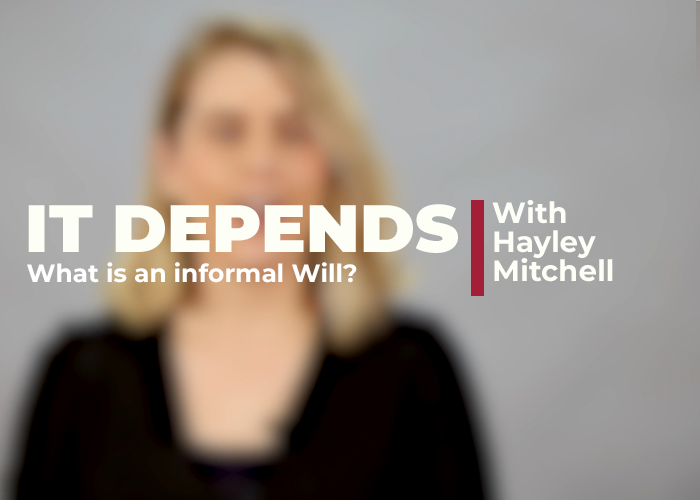Cooper Grace Ward assisted GemLife (ASX:GLF) with its listing on the Australian Stock Exchange. With $750 million in capital raised, the GemLife listing has become Australia’s largest IPO of 2025. ...

In this week’s edition of ‘It depends’, partner Hayley Mitchell talks about what an informal Will is, what the process is for proving one and what you should do if you find a document that might be an informal Will.
Hello and welcome to another edition of It depends. Today, I’m going to be covering what is an informal Will.
An informal Will is a document proven to be the last Will of the deceased, even though it might not have been witnessed in the proper way that a Will requires, or the document may not have been signed at all. In some circumstances it will be possible to prove these documents as an informal Will, which allows the deceased’s wishes and intentions to be carried out in a binding way.
An application must be made to the Supreme Court, and the court must be satisfied that the deceased intended for the document to operate as their last valid Will. So, it won’t be enough to present a handwritten note that is simply jotting down some thoughts and wishes from the deceased. There needs to be more proven in order for the court to make the order.
The type of evidence that the court will be looking for will differ in each case, but typically they’ll be looking for a couple of things. First, was the deceased aware of what the formal requirements were to make a Will? If it can be shown that the deceased understood that a will needed to be signed and witnessed in a certain way and the document hasn’t been signed at all, it may be difficult to prove that the deceased intended the document to operate as a Will because they clearly understood that that document wasn’t a Will because I hadn’t signed it. Second, how did the deceased treat the document? Did the deceased place a lot of importance on the document? If so, then it will be easier for the court to determine that they intended it for that document to be their Will. If the deceased really didn’t place much importance on it, hadn’t talked about it a lot, then it’s going to be difficult to show that that document was intended to be a Will. And last, what’s the period of time that has passed between the document being created and the person’s death? The longer the period of time, the less likely it is that the court will find they intended for it to operate as a Will. The other thing is, the more time that has passed, the more difficult it is to find and gather relevant evidence about the document.
The cases have dealt with a number of different scenarios where a document has been proved to be a formal Will. These include things like a Word document stored on a computer, so a document that hasn’t been printed at all. A text message, suicide notes, videos, voice recordings or simple examples where a husband and wife have signed each other’s Wills accidentally, or the solicitor’s notes of the meeting with the deceased, whether they’d been signed by the deceased or not, or a draft Will that hasn’t been signed at all.
First, seek legal advice. Whether an application is made to the court will depend on a variety of factors though. The first and probably most important question is the cost of making the application compared to what happens with the estate if the document isn’t proved as an informal Will and weighing up the pros and cons there. Secondly, your legal adviser will also look at whether there are any other disputes within the family or the beneficiaries, and look at from a strategic point of view whether the informal rule needs to be proved at all. Lastly, it really will depend on the state of the evidence. If you’re not able to produce much evidence or information about how the document came into existence, then it may be very difficult to prove the document as an informal Will and the advice may be that you are unlikely to succeed even if an application is made to the court. If you want more information or advice about an informal Will or an estate dispute, contact a member of our private client team.
This publication is for information only and is not legal advice. You should obtain advice that is specific to your circumstances and not rely on this publication as legal advice. If there are any issues you would like us to advise you on arising from this publication, please let us know.
Subscribe to our interest lists to receive legal alerts, articles, event invitations and offers.
Cooper Grace Ward acknowledges and pays respect to the past, present and future Traditional Custodians and Elders of this nation and the continuation of cultural, spiritual and educational practices of Aboriginal and Torres Strait Islander peoples.
Fast, accurate and flexible entities including companies, self-managed superannuation funds and trusts.